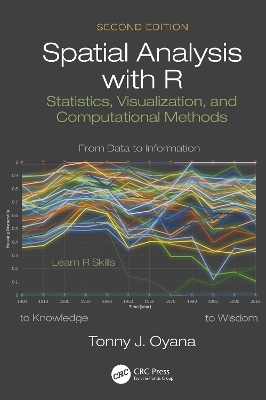
Spatial Analysis with R
CRC Press (Verlag)
978-0-367-86085-1 (ISBN)
In the five years since the publication of the first edition of Spatial Analysis: Statistics, Visualization, and Computational Methods, many new developments have taken shape regarding the implementation of new tools and methods for spatial analysis with R. The use and growth of artificial intelligence, machine learning and deep learning algorithms with a spatial perspective, and the interdisciplinary use of spatial analysis are all covered in this second edition along with traditional statistical methods and algorithms to provide a concept-based problem-solving learning approach to mastering practical spatial analysis. Spatial Analysis with R: Statistics, Visualization, and Computational Methods, Second Edition provides a balance between concepts and practicums of spatial statistics with a comprehensive coverage of the most important approaches to understand spatial data, analyze spatial relationships and patterns, and predict spatial processes.
New in the Second Edition:
Includes new practical exercises and worked-out examples using R
Presents a wide range of hands-on spatial analysis worktables and lab exercises
All chapters are revised and include new illustrations of different concepts using data from environmental and social sciences
Expanded material on spatiotemporal methods, visual analytics methods, data science, and computational methods
Explains big data, data management, and data mining
This second edition of an established textbook, with new datasets, insights, excellent illustrations, and numerous examples with R, is perfect for senior undergraduate and first-year graduate students in geography and the geosciences.
Professor Tonny J. Oyana received his Ph.D. and his postdoctoral training from the University of Buffalo, New York, USA. He currently serves as the College Principal at the Makerere University College of Computing and Information Science, Kampala, Uganda. He has served for over 20 years in several academic positions at the Southern Illinois University Carbondale and University of Tennessee Health Science Center, Memphis, USA. His research focuses on establishing whether there is a link between environmental health and exposure; advancing GIS methods, algorithm design, and spatial analytical methods; and understanding the factors that contribute toward land systems change. He has authored or co-authored more than 100 scientific works.
The Context and Relevance of Spatial Analysis. Scientific Observations and Measurements in Spatial Analysis. Using Statistical Measures to Analyze Data Distributions. Exploratory Data Analysis, Visualization, and Hypothesis Testing. Analyzing Spatial Statistical Relationships. Engaging in Point Pattern Analysis. Engaging in Areal Pattern Analysis Using Global and Local Statistics. Engaging in Geostatistical Analysis. Data Science: Understanding Computing Systems and Analytics for Big Data
| Erscheinungsdatum | 03.08.2020 |
|---|---|
| Zusatzinfo | 50 Tables, black and white; 43 Illustrations, color; 68 Illustrations, black and white |
| Verlagsort | London |
| Sprache | englisch |
| Maße | 156 x 234 mm |
| Gewicht | 821 g |
| Themenwelt | Mathematik / Informatik ► Mathematik |
| Naturwissenschaften ► Geowissenschaften ► Geografie / Kartografie | |
| Naturwissenschaften ► Geowissenschaften ► Hydrologie / Ozeanografie | |
| ISBN-10 | 0-367-86085-6 / 0367860856 |
| ISBN-13 | 978-0-367-86085-1 / 9780367860851 |
| Zustand | Neuware |
| Informationen gemäß Produktsicherheitsverordnung (GPSR) | |
| Haben Sie eine Frage zum Produkt? |
aus dem Bereich


